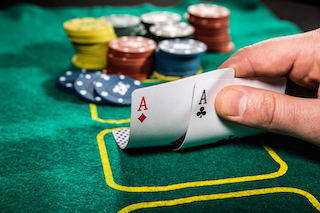 Gambling problems are on the rise in the United States, the United Kingdom, and Australia as well as many other developed countries worldwide. And gamblers don’t need to leave the comfort of their own home to indulge in problem gambling behavior. Online gambling provides them with easy access to gambling sites via their computer, tablet or smartphone.
Gambling problems are on the rise in the United States, the United Kingdom, and Australia as well as many other developed countries worldwide. And gamblers don’t need to leave the comfort of their own home to indulge in problem gambling behavior. Online gambling provides them with easy access to gambling sites via their computer, tablet or smartphone.
A new study published in the Journal of Economic Modelling found a positive association between gambling behavior and depression with significant emotional and mental health costs in England and Scotland where the study took place.
Researchers of the current study used a population-based sample while previous studies on gambling and depression used clinical samples.
“It is important to look at this relationship via population-based samples so that the impacts can be identified across the full spectrum of gambling behaviors, from abstainers to pathological gambles,” note the study’s authors.
Research has shown that up to 75 per cent of Britains gamble at least once a year and problem gambling has increased by 451,000 people since 2007. Gambling costs the British government approximately £1.2 billion due to the negative effects of gambling on social services.
While gambling can be a source of fun and leisure for some, for others, it can become a problem. Researchers looked at what motivated problem-gamblers to return to gambling if the response was always negative.
“It is clear that problem and pathological gambling exists and that for some individuals gambling participation is not utility-generating,” ponder the researchers, begging the question as to why people continue to consume behaviors that are destructive and lack a basis in rationality.
To answer this question, the researchers proposed a formula: the “expected utility plus psychological effects” utility function. They posited that if the positive psychological effects of gambling outweigh the negative outcomes, problem-gamblers will continue to gamble. Whether this changes or not, argue the researchers, depends on personality and the gambling environment.
“In the theoretical framework, gambling is rational for non-addicted consumers and irrational for addicts; and we argue that it is this irrational and suboptimal behavior that leads to depression,” write the researchers. They further explain how people who continue to engage in irrational behavior on a repetitive basis are much more at risk to develop mental health diagnoses related to depression and anxiety.
The researchers suggested two ways in which gambling addiction could lead to depression: 1) Awareness of a gambling problem on the part of the problem-gambler; and 2) The indirect effects, harms and consequences of excessive gambling. They also predict that the depression would be worse in those who gamble online versus those who were able to benefit from social interaction at gambling venues.
To obtain answers to their questions and to test their theories and hypotheses, researchers looked at data from the 2012 Gambling In England and Scotland survey, the most recent gambling and depression data available with a sample size of 13,106, of which researchers will able to use the data from 9049 people.
The survey asked gamblers to rate from 1 to 4, 1 denoting “not at all” and 4 “much more than usual” as to whether they had been recently feeling unhappy and depressed. Problem-gamblers were diagnosed via the survey using the Diagnostic and Statistical Manual of Mental Disorders (DSM) criteria for gambling addiction. The researchers found that higher levels of depression were associated with higher DSM gambling addiction scores.
The results, according to the study's authors, suggests that not only is excessive gambling markedly associated with higher reported levels of depression, it also shows that pathological gambling as a transitional growth from social gambling greatly increases and exacerbates the negative impacts of resulting depression and anxiety. “Thus, our use of population-based data reveals that gambling and depression are correlated even at subclinical levels of gambling addiction,” the authors write.
The same results can ben seen from studies in Australia, Canada and the United States as well as other European studies. With their study, researchers will also able to determine that online gambling poses more of a risk to depression than venue-gambling and suggest public health policies be geared towards minimizing the harmful effects of gambling through education, awareness, and specialized support services.
Patricia Tomasi is a mom, maternal mental health advocate, journalist, and speaker. She writes regularly for the Huffington Post Canada, focusing primarily on maternal mental health after suffering from severe postpartum anxiety twice. You can find her Huffington Post biography here. Patricia is also a Patient Expert Advisor for the North American-based, Maternal Mental Health Research Collective and is the founder of the online peer support group - Facebook Postpartum Depression & Anxiety Support Group - with over 1500 members worldwide. Blog: www.patriciatomasiblog.wordpress.com
Email: tomasi.patricia@gmail.com